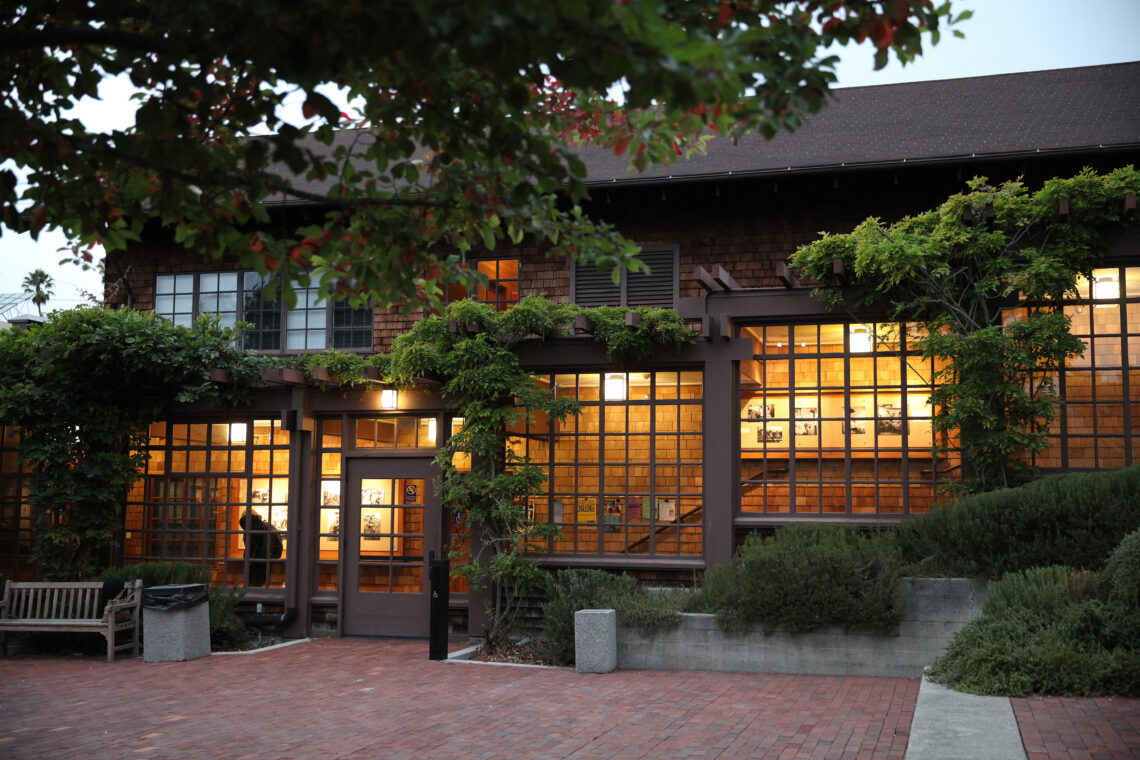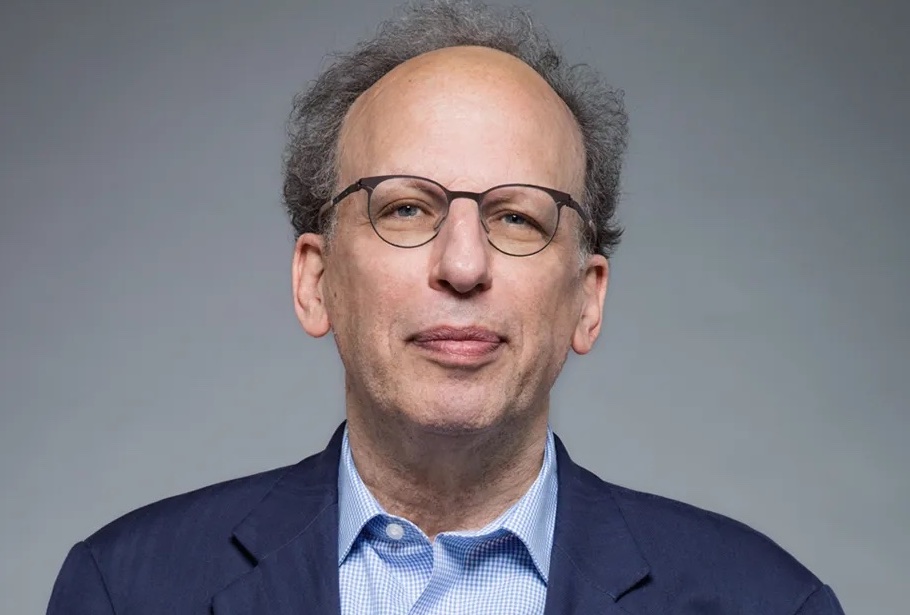
From left to right: Grace Oyenubi, Lauren Schwartzman, Alan Toth, Nani Walker
Recent graduates of the UC Berkeley Graduate School of Journalism dominate the nationwide slate of finalists for Student Academy Awards in documentary film, which was posted Aug. 12.
The 2018 thesis films of four graduates —Grace Oyenubi, Lauren Schwartzman, Alan Toth and Nani Sahra Walker — accounted for three of seven finalist spots in the documentary category for U.S. film schools.
“Our grad students earned more Student Academy Awards finalist slots this year than any other film school in the country,” said Jon Else, formerly longtime head of Berkeley Journalism’s documentary program, who helped shepherd student doc theses last fall. “And we’re not even listed as a film school. It’s just remarkable,” Else says.

Lauren Schwartzman and Emily Thomas filming with atmospheric scientist Hongbin Yu at NASA in Washington, D.C. Photo: Patrick Lynch
In the visually lyrical “Dust Rising,” Schwartzman explores the vast power mere dust can have over everything from human health to the planet’s climate and the growing phenomenon of deadly dust storms in the American Southwest.
“I tried not to have any expectations about my documentary getting nominated,” she said. “When you’re so close to a film, it’s really hard to see it objectively and form any idea of how it might be received. So I’m grateful that people enjoy it and get something out of watching it.”
Oyenubi and Walker travelled to Nigeria to tell the intimate stories of three women who fled their village when militant group Boko Haram invaded in 2014.
“’Forced’ is the remarkable story of women who are rebuilding their lives after abduction, rape, and displacement during the Boko Haram insurgency,” Walker said. “It’s about the resilience of these survivors. We wanted to raise awareness about sexual violence, trauma, and the atrocities of war and conflict.”
For Oyenubi, a journalist from Nigeria, the story hit home. “I had followed closely the rise of the dreaded militant group in the Northeast, and most especially the families that were separated, kids who lost opportunities for education when they fled their communities after each attack.
“We are excited the Academy picked our movie,” she said, “It says a lot about the diversity of works chosen.”

Grace Oyenubi and Nani Walker on location in Nigeria.
In “Mining Phosphorus,” Toth, with the help of classmate Laura Newberry, tackles Florida’s declining phosphate reserves and the clash over a mining operation between a farmer and local environmentalists.
“I spent many years working in independent film, not only indie producing, but distribution as well,” Toth said. “I’d spend half my day making cold calls to universities, hoping they’d license my film. Spending so many hours hawking my wares, it was easy to feel as though I wasn’t in the same league as other filmmakers. This nod from the Academy provides an immediate legitimacy. I won’t have to work quite so hard to convince people to support my work.”
That the documentary class, with its track record of award-season success, did so well this year was not a surprise.

Alan Toth shoots footage for Mining Phosphorus at a farm in Bradford County, Florida.
“That reputation is what made it worthwhile for me to go back to school mid-career,” Toth said. “I’m told that three Berkeley finalists for the Student Academy Awards is unprecedented. It certainly speaks well of the program. Despite the never-ending money troubles, the J-School documentary program is still producing some of the best graduates in the business.”
Else credited the blue and gold wave in part to how the films are “generally about real stuff — stuff that matters” and would fly under the radar without the cameras and microphones of Toth, Walker, Oyenubi, and Schwartzman.
He likened the process of conceiving, reporting, and producing a documentary film to a “rollercoaster” and a “fifth-order differential equation:” It requires navigating all sorts of issues, from access to subjects and locations, to confirming the veracity of one’s reporting, to juggling all the associated expenses, to thinking on one’s feet when filming on the ground.
Doc theses are also collaborative undertakings.
“I’m grateful to the other members of the 2018 documentary class and to my professors and advisors,” Schwartzman noted.
Else attributed an “awful lot of the credit” to fellow doc teacher Spencer Nakasako, who led the doc program and with whom he co-taught a production seminar. Other guiding hands were the School’s “tireless” production manager Chris O’Dea and editing teacher Mike Shen.
“It’s a stunning accomplishment for our tiny program to sweep nearly half the Student Oscar nominations nationally for documentary, and it speaks volumes about the skill and dedication of these students and their teachers,” said Dean Ed Wasserman. “We’re very proud, and we wish them all every success.”
Each of the four nominees received production funding from Minette Nelson and David Eckles of The Filmmaker Fund, and Jigar Mehta (’05) and Annika Dubrall through direct grants to students through the Fine Cut Fund at the J-School.
Last year, grads Brad Bailey (’17) and Jason Hanasik (’17) were named finalists for Student Academy Awards for their respective films “Hale” and “How to Make a Pearl.” Bailey went on to win the gold for documentary. The year prior, producers Melina Tupa (’16) and Daphne Matziaraki (’16) were nominated. Matziaraki took home the top prize.
The 45th Student Academy Awards will be presented in Beverly Hills on Oct. 11.
By Sam Goldman (’19)
About the Documentary Program at UC Berkeley
UC Berkeley’s documentary program is widely considered one of the most important graduate nonfiction film programs in the country. Carrying on the work begun in the 1980s by producer Andrew Stern and pioneering African American filmmaker Marlon T. Riggs, professors Jon Else, Orlando Bagwell and others have trained hundreds of filmmakers of remarkable talent, diversity and accomplishment.
Grounded in the values of professional journalism–accuracy, eloquence, aggressive research and reporting, strong writing, ethics and analysis–combined with the fundamentals of filmmaking craft, documentary at UC Berkeley emphasizes visual storytelling in a wide range of storytelling styles: investigative, historical, biography, personal essay and cinéma vérité. Alumni routinely have premiere screenings at the top film festivals in the world, among them Sundance, Cannes, SXSW, and Tribeca.
Help the next generation by making a tax-deductible donation to our Fine Cut Fund. The fund supports documentary and multimedia projects and helps defray the hard costs of production—travel and shooting expenses, outlays for equipment and research.



